Test Tab
The Test Tab specifies the tests to run and the level of JUnit test runner to use.

Tests to Run
The JUnit Plug-in Test launcher allows you to run single tests or collections of tests en masse.
If the individual test option is chosen, you have to specify the fully-qualified test class name along with the name of the plug-in project where the class is located. The launcher can give you more granularity for single tests by allowing you to choose to run a single method from within a test class.
You also have the option to run all tests housed within a container (project, package or a source folder). In addition to the convenience of running an arbitrary number of test cases with a single click, this option gives you the additional flexibility of not having to update the launch configuration every time you add a test class to your suite. The list of tests is dynamically recomputed prior to every launch based on the current contents of the container.
Test Runner
Eclipse provides two JUnit test runners:
-
JUnit 3: uses JUnit 3.8.1. This is the default test runner.
-
JUnit 4: uses JUnit 4.1.0 and is available only if you are running Eclipse with a JRE version that is greater than or equal to 1.5.
